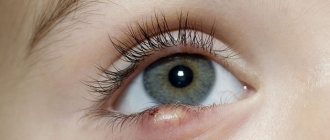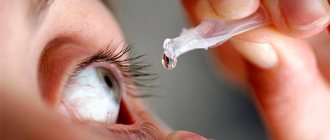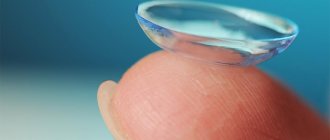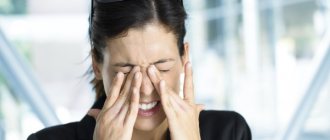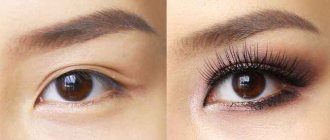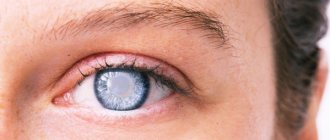There is probably no such person who, at least once during a period of his life, has not encountered involuntary blinking of the eyelids or has not noticed this feature in others. From a scientific point of view, this phenomenon is called nervous tic or blepharospasm and is characterized by rapid, uncontrolled, monotonous muscle contraction.
The duration of such an attack is up to 10 minutes and tends to stop on its own, but the duration may increase to several days.
Causes
A nervous tic of the eye does not pose a serious threat to human life and health, but is a signal that a malfunction is occurring in the body. Possible factors causing this process include:
- Contact of a foreign object with the mucous membrane of the eye.
- Excessive dry eyes.
- Reaction to light.
- Irritation of the cornea.
- Poor nutrition. An imbalance of certain microelements (glycine, calcium, magnesium) can cause spasms and various types of seizures.
- Incorrect combination of physical activity and rest, insufficient time for sleep.
- A consequence of taking certain types of medications.
- Heredity, genetic predisposition.
- Common fatigue associated with insufficient lighting, prolonged time spent at a computer monitor or watching TV.
- The most commonly known cause of nervous eye tics is stress, mental and emotional disorders. These factors do not cause an immediate reaction, but over time they can cause reactive symptoms.
- Redness of the eyes.
The above reasons do not always serve as a reason for involuntary muscle contraction. Sometimes this illness directly depends on the following previously suffered diseases:
- Injury to the facial nerve.
- Inflammatory processes of the membrane of the eye (conjunctivitis).
- ORZ.
- ARVI.
- Parkinson's disease.
- Bell's palsy.
- Infection with worms and other parasites.
- Inflammation of the eyelid.
- Birth injuries.
- Brain oncology.
- Vegetovascular dystonia.
A nervous tic of the eye affects mainly the psychological state of a person, but sometimes slight discomfort is felt if muscle tension increases.
Alleged reasons
Why does the upper eyelid twitch? Factors causing diseases can be single or combined. Contacting a specialist will make it possible to accurately determine the root cause of hyperkinesis and receive symptomatic treatment.
It does not matter fundamentally whether the eyelid twitches in the right eye or the left; twitching of the eyelid in a child can occur under the influence of the same factors as in an adult, with minor exceptions.
More details about the reasons:
Nervous tic - the danger of its occurrence lies in the failure of the nervous system. Often appearing and for no apparent reason not going away after rest and sleep is a reason to consult an ophthalmologist.
Eye diseases – conjunctivitis, chalazion, blepharitis.
Overwork - moral or physical - does not matter for illness.
Cervical osteochondrosis – prolonged compression of blood vessels causes a deficiency of essential substances.
Hypovitaminosis (avitaminosis) – insufficient intake of calcium and magnesium into the body.
Facial hemispasm is a disruption of the normal functionality of the muscles of the facial nerve. Leads to deterioration of visual acuity due to excessive pressure on the eyeball and associated malnutrition.
Wearing contact lenses occurs due to microtrauma of the cornea of the eyes and eyelids, especially when using rigid (hard) lenses.
Dryness of the eyeball - predominates in the elderly, can occur due to violations of the rules for wearing lenses.
A sharp decrease in the functionality of the autoimmune system.
Allergic reactions – cause swelling, thereby impairing the supply of blood and nutrients.
Alcohol, strong coffee, tea, smoking.
Overfatigue (in childhood) - the child cannot withstand the school load and spending a long time with textbooks.
Long-term (continuous) wearing of glasses.
Conflicts with parents (brothers, sisters, older generation) - excessive demands (for studies, household duties) can cause twitching of the upper eyelid.
Infectious diseases, colds, surgical interventions.
Eye fatigue - sitting for many hours at the computer, in front of the TV, reading textbooks, fiction.
Helminthiasis – the presence of helminths in children and adults causes vitamin deficiency in the body.
Cardiovascular dystonia is the most rare cause of upper eyelid twitching.
This is not a complete list of root causes that answer the question “why does the upper eyelid twitch”? Comprehensive data can be obtained through a medical examination. A number of diseases provoke the appearance of eyelid twitching:
- atherosclerotic changes in vascular walls;
- ICP syndrome;
- Gilles de la Typette syndrome;
- tumors located in the brain;
- inflammatory process affecting the facial nerve;
- neuroses;
- parkinsonism;
- mental illness (depression, schizophrenia);
- postnatal trauma;
- damage to the contents of the brain by viruses and bacteria (meningitis, encephalitis);
- traumatic brain injuries sustained at any age;
- epilepsy.
These diseases are not limited to the upper eyelids; in some cases, the face is affected.
Eye twitching - causes and treatment
A condition in which the orbicularis oculi muscle involuntarily contracts over a certain period of time is medically called a nervous tic, blepharospasm or hyperkinesis.
A similar phenomenon happens:
- primary (tic is rare and lasts no more than 10 minutes);
- secondary (eye twitching is repeated regularly, and can persist for several hours).
You can explain why the eye twitches by listing the most common causes of blepharospasm.
The violation often becomes a consequence (reasons for which the eye twitches):
- Excessive fatigue of the visual apparatus due to overstrain of the eye muscles.
- Significant stress on the nervous system.
- Ophthalmological diseases (conjunctivitis, keratitis, blepharitis and others).
- The use of lenses that causes drying of the mucous membrane.
- Prolonged use of medications that lead to irritation of the mucous membranes or negatively affect the brain.
- Rubbing your eyes with dirty hands or getting foreign bodies into them.
- A reaction to an allergen, accompanied by redness, itching, muscle twitching and swelling.
- Genetic factor. Typically, an involuntary contraction that is inherited goes away as you get older.
- Development of Gilles de la Tourette syndrome, Parkinson's disease, Bell's palsy and brain tumors.
- Vitamin deficiency. Due to a lack of calcium, glycine and magnesium, problems occur in the functioning of the nervous system. The situation is aggravated by excessive consumption of coffee, alcohol, black tea and energy drinks.
- Weakened immune forces after suffering from acute respiratory viral infections or acute respiratory infections.
- CNS disorders. The cause of nervous tics is increased reflex excitability and muscle hypertension.
- Problems with cerebral circulation and the development of arterial hypertension.
- Head bruises and birth injuries.
If a nervous tic appears regularly and causes significant discomfort, medical attention will be needed.
Twitching right eye - causes
Blepharospasm can affect any eye. However, there have long been signs that explain what events should be expected if twitching is noted in the right eye.
In this case, the phenomenon indicates profit and good news. And young girls should prepare to meet their future spouse.
If the tick affects the left eye
If there was discomfort on the left side, people tried to recover from it as quickly as possible, since the sign indicated impending losses and troubles.
Regardless of the meaning of beliefs, you should not rely on them. The presence of hyperkinesis is a signal that a person should see a doctor.
How to get rid of the problem, treatment for adults
What is the treatment if the eye twitches? The easiest way to cope with a nervous tic is at the initial stage, and you need to act comprehensively.
When the eye twitches in adults (manifestations of blepharospasm are noted), treatment requires compliance with a list of recommendations:
- Regular exercises aimed at relaxing the eye muscles are recommended.
- If the cause of hyperkinesis is a stressful condition, herbal infusions with a sedative effect or drugs (tablets, drops) that help eliminate neuroses are prescribed.
- It is necessary to adjust the daily routine and review the nutritional diet.
- When a spasm begins to bother you, doctors advise giving your eyes a little rest by blinking frequently.
- In the presence of primary blepharospasm, it is worth minimizing communication with people who contribute to the deterioration of the emotional state.
- It would not hurt to take vitamins, the deficiency of which provoked a nervous tic.
- Often the disorder is caused by excessive dryness of the mucous membrane, so drops with a moisturizing property may be needed.
If the problem is the result of a disease, the patient will need to undergo a full course of therapy using appropriate medications.
Common causes of nervous tics
Almost everyone has encountered this disease. This is why many people wonder why the left eye (lower eyelid) twitches. Signs associated with a nervous tic most often indicate that either good luck awaits a person, or, conversely, tears and misfortune. For example, when the left eye pulsates, you should expect disappointments and failures, and the right eye - profits. But these are just beliefs.
The most common causes of lower eyelid pulsation include:
- Strong experiences cause damage to the nervous system, causing the eye to pulsate.
- Lack of magnesium, calcium and vitamins, which are necessary for the health of the nervous system.
- Xerophthalmia, dry eyes are especially observed in the older generation. In young people, this condition occurs due to the use of contact lenses, working at a computer for long periods of time, and taking certain medications, such as allergy medications or antidepressants.
- Infectious pathology. In some cases, patients feel the eye pulsating even after complete recovery. This is due to the fact that the nervous system is depleted during illness.
- Eye fatigue (most often causes twitching of the lower eyelid).
- Smoking and alcohol abuse leads to disruption of the formation of nerve cells. Bad habits often provoke the appearance of tics.
- Sleep deficiency. When you don't get enough sleep, your body begins to experience stress, which leads to various adverse effects, including eye twitching.
- A genetic factor that usually manifests itself in children whose parents also suffered from eye twitching in their youth. This problem goes away on its own with age.
- Often, uncontrolled movement of the eyelid occurs due to eye injury or allergies.
If you do not experience any overwork, but the lower eyelid of your left eye is constantly twitching, then only an ophthalmologist or a neurologist can determine the treatment and provoking factors. In this case, it is better to see a specialist to avoid complications.
Classification
Nervous tics are usually divided into groups depending on:
- Manifestations - facial (facial muscles), vocal (voice muscles), motor (skeletal muscles, arms and legs spasm), sensory (groundless sensations of cold or heaviness in various parts of the body).
- Difficulties - simple (characterized by monotonous twitching), complex (various muscle groups are involved).
- Distribution: local (one muscle group is involved), generalized (almost the entire body is affected).
How to quickly eliminate a nervous tic?
If you know exactly why the lower eyelid of your left eye twitches, you can get rid of this ailment in a few seconds. To stop twitching caused by fatigue, you need to close your eyes tightly, inhale and exhale deeply, and then slowly open your eyes. As a rule, this technique helps to remove the pulsation of the eyelid, but for a while.
The easiest way to remove a nervous tic in the left eye or right eye is gymnastics. It will only take about ten minutes, and even at work you can find such a short time, for example, by going to the toilet. Need to:
- Blink your eyes properly. Open your eyes as wide as possible, then close them and squeeze them tightly. Repeat the sequence, putting strength into it, until tears come. This will moisturize the cornea, help improve blood circulation and evenly distribute the tear film. If the twitching gets worse or pain appears, the exercise should be stopped.
- Conduct a self-massage session. To do this, use your middle fingers to massage your lower eyelids in a circular motion. This will relieve tension and strengthen your muscles.
- Blink quickly. It is recommended to imagine that your eyelashes are the wings of a butterfly, and blink quickly, quickly, raising and lowering them. This will improve circulation.
- Relax. Lower your eyelids and relax them as much as possible. Then close your eyes, tense, and then relax again without opening your eyes. Repeat several times - the exercise should take about a minute.
The final stage is contrast washing. First you need to wash your face with cold water, then immediately with warm water. This will dilate the blood vessels, improve blood flow to the eyelids and, accordingly, their circulation.
If after all the manipulations the eye continues to twitch, there is a chance that this is not nervous strain, but one of the diseases, and it is better to make an appointment with a doctor.
What to do if you constantly twitch under your eye
You notice that you have frequent or constant twitching under your eye. What do we have to do? First, find out the cause and rule it out. Normalize your rest, stop drinking energy drinks and coffee, learn to control negative emotions. This will help not only to relieve nervous twitching, but also calm the nervous system as a whole.
Video: Three tests if your eye twitches
If you still have twitching in the lower eyelid of your left or right eye (or both at once - in severe cases), then treatment with medications, physiotherapy, and folk remedies will help you.
At what age does it occur?
Symptoms of this disease can overtake a person at any age. Its manifestation in adults is caused by a number of factors such as:
- stress;
- overwork;
- excessive emotionality.
It is possible to cope on your own only if you accurately determine the cause that needs to be safely eliminated.
Children also face similar troubles.
According to statistics, this phenomenon is most common in the period from 1.5 to 17 years. The problem worsens at 3 years and from 7 to 11 years. Boys (about 15%) suffer more than girls (11%).
In order not to let the situation get worse, you need to carefully monitor the child and, in case of involuntary twitching, switch attention to other activities or objects. The causes may be:
- constant quarrels between parents;
- genetic predisposition;
- overprotection or, conversely, disinterest.
When blepharospasm occurs in children, it is important not to focus on the problem, since they often do not realize their defect and therefore do not experience discomfort, and at this age there is a high probability of self-healing.
Which doctor should I contact?
A neurologist treats pathologies of a neurological nature. If the patient regularly twitches the eye or only the upper eyelid, it is worth visiting this specialist for an examination. After the first examination, the doctor examines the history of previous diseases, interviews the patient and identifies the probable cause of the disorder.
If necessary, a consultation with an endocrinologist, ophthalmologist, or cardiologist is scheduled. In most cases, concomitant diseases from other systems and organs are detected.
Diagnostics
When one discovers certain symptoms, every person wonders how to get rid of a nervous tic of the eye. To do this, you should visit a qualified neurologist, who will begin your appointment with a banal survey:
- identifying the first attack,
- duration,
- information about previous diseases,
- Next, the state of the nervous system is assessed.
If the doctor is not able to see the manifestation of symptoms in person, a request may be made to record the attack on video. And also likely the purpose:
- general blood test (detection of inflammation),
- biochemical blood test (detection of diseases of internal organs),
- radiography,
- computed tomography,
- electroencephalography (assessment of the state of the brain),
- oncologist consultation,
- traumatologist,
- psychiatrist.
Why do eyelids twitch?
- Visual fatigue. The most common reason that causes eyelid twitching is eye fatigue. Long time spent doing exciting and necessary work at the computer, reading in a vehicle, poor night's rest, all this overstrains the muscles around the eyelids.
- Nervous overstrain. The eyelid may begin to twitch with a slight nervous overload, when the psychological side is under tension for a long time, subsequently stress occurs.
- Neurosis. The reason why the upper or lower eyelid begins to twitch may be due to neurosis. And if in this case the eye twitches strongly, you don’t know what to do, then, first of all, you should find the factor that causes the injury - that is, the circumstances that caused the stress and the emotional or intellectual source that influenced the mental overstrain. In this case, only common sense and rethinking the situation can help. Having analyzed the cause of a nervous breakdown, draw the right conclusion, eliminate the stress factor, so that in the near future everything will not happen unexpectedly and again. Be sure to relax, calm down and give your body a rest.
- Conjunctivitis. Doctors often associate eyelid twitching with the fact that the mucous membrane of the eye is inflamed and irritated. When your vision is under prolonged strain, you feel as if sand has been poured into your eyes; you constantly want to blink or squint to relieve the discomfort. In this case, it is necessary to consult an ophthalmologist who can prescribe a course of treatment for conjunctivitis. Otherwise, blurred vision, eye twitching, frequent blinking, squinting will become a habit, due to which in the future it will be difficult for you to get rid of a nervous tic, which will also affect your vision and it may worsen.
- Eye diseases. If the conjunctiva is normal, there is no itching under the eyelids, the mucous membrane is pink, but the vision is blurry, especially in the evening, then you should definitely go to see an ophthalmologist so that he can identify the cause that strains and makes the eyes twitch and impairs vision.
- Hereditary factor. It happens that twitching of the upper or lower eyelids is a hereditary factor passed on from parents.
- Weakened immune system. You may experience a nervous tic or twitching of the eyelid if you have a weakened immune system, or if you have recently had an infectious disease, an acute respiratory viral infection, or an acute respiratory disease.
- Nervous disorders. Twitching of the eyelid causes a disorder of the nervous system.
- Poor blood circulation in the brain. If the eyelid twitches, this may also indicate poor circulation in the brain and high blood pressure. In this case, you should definitely consult a neurologist and go for an MRI.
- Chronic neuroses. In this case, the twitching is compared to a psychotraumatic situation; the person is subjected to severe nervous strain. You should definitely remove the factor that is traumatic to the psyche, and then start taking sedatives. If the situation has not gone too far, then it is quite possible to get by with herbs to treat the nervous system: mint, lemon balm, motherwort, valerian.
- Medicines. Some medications can cause twitching of the eyelids. These are mainly psychotropic medications taken for epilepsy and the treatment of psychosis.
- Injuries and various diseases can also be the cause. Eyelid twitching causes concussions, brain tumors, head injuries, ear diseases, stroke and parasitic diseases.
Discomfort under the eye - why the lower eyelid is affected and what to do
If you feel an uncontrollable contraction of the muscle under the eye, perhaps the cause lies in nervous exhaustion or excessive fatigue of the visual organs. Short-term twitching can be triggered by drinking a large dose of caffeine in the morning.
The lower eyelid often suffers from a significant amount of alcoholic drinks, since alcohol negatively affects the nervous system, causing a malfunction in its functioning. Hyperkinesis in the area under the eye is sometimes a symptom of a serious illness. We are talking about inflammation of the facial nerve.
Pathology develops against the background of:
- hypothermia;
- meningitis;
- an enlarging tumor;
- herpes infection;
- facial injuries;
- chronic sinus diseases and other disorders.
The disease, often occurring on one side, is accompanied by many symptoms, for example:
- reduction/increase in sensitivity of the affected part of the face;
- deterioration of visual functions;
- profuse lacrimation;
- distortion of certain areas of the face;
- hearing problems;
- involuntary muscle twitching.
If hyperkinesis was caused by overwork, you need to rest more. You should also drink less coffee and refrain from drinking too much alcohol.
For inflammation of the facial nerve, various medications are prescribed: glucocorticosteroids, antispasmodics, diuretics, antiviral drugs, drugs with a vasodilator effect. The treatment regimen is drawn up on an individual basis.
Drug treatment
To cure a nervous tic of the eye, it is necessary to carry out all the research and strictly adhere to the recommendations of the supervising doctor. The following types of drugs are used:
- Complexes of vitamins and minerals, which contain the required amount of calcium, potassium, iodine, magnesium, selenium and B vitamins.
- Preparations containing blueberries or fresh berries that have a beneficial effect on the eyes.
- Substances that improve blood circulation and metabolic processes in the brain.
- Etiotropic therapy (fighting the underlying disease).
- Botulinum toxins or antipsychotic drugs (elimination of symptoms).
- Psychotherapy sessions (work to overcome fears, anxiety, self-doubt).
- Surgical intervention. The doctor identifies the most strongly contracting fibers and cuts them.
- Botox. This substance promotes relaxation and stops contractions.
- Massage. Indicated to normalize muscle tone, the state of the nervous system and improve blood circulation.
Eye exercises
If a frequent question becomes how to get rid of a nervous eye tic, you can resort to the following actions:
- You need to close your eyelids tightly, and then open them with a sharp movement. Continue doing this until tears come out.
- Massage the area under the eye, then blink for 30 seconds.
- It is necessary to leave your eyes half-closed until there is no trembling, then blink for 1 minute.
These exercises cannot act as the main type of treatment, but will become an assistant in emergency situations.
Medical reasons
From a medical point of view, a nervous tic can have many causes. Let's look at them in more detail.
Lack of vitamins
Most often, this problem appears at the end of winter or spring. During this period, the supply of vitamins in the body is severely depleted due to a decrease in fresh fruits and vegetables in the diet. In addition, cloudy weather and reduced daylight hours have a strong impact, which leads to a decrease in vitamin D in the body. These problems can be easily solved with the help of a vitamin complex.
IMPORTANT! Sometimes, to eliminate tics, it is enough to include only B vitamins and potassium with magnesium in your diet. Therefore, before buying a vitamin complex, consult a doctor who will make an accurate diagnosis and prescribe the necessary medications.
Lifestyle influence
Constant lack of sleep, prolonged stress, both at work and at home, poor diet and bad habits can cause overwork of the nervous system and its inadequate functioning. This is one of the most common causes of left eyelid twitching.
Don't try to radically change your life in the right direction in a few days. This will lead to even more stress, and the tic will only get worse.
Implement one correct habit every two to three weeks, then it will be easier for the body to adapt to new conditions.
Eye diseases
With diseases such as neuritis, optic nerve atrophy, ophthalmoplegia, diplopia, and even conjunctivitis, the transmission of nerve impulses from the brain to the eye muscles can be disrupted, which leads to the appearance of a tic.
Tired eyes
If you read a lot while lying down or in the dark, work at a computer for a long time or constantly use a smartphone, your eyes get very tired and their muscles stop working adequately. In this case, you need to give yourself rest and do basic eye exercises.
Treatment of ocular hyperkinesis with medications
If the use of traditional medicine and special exercises to relieve fatigue, in which the eye twitches, is ineffective, eye drops are used that resist dryness and can moisturize the mucous membrane.
Among them, the most effective was the use of:
In case of allergic effects on the occurrence of eye tics, taking drugs that do not cause drowsiness and do not impair psychomotor functions has proven effective, namely:
The doctor can also prescribe vitamin complexes, microelements and sedatives that can strengthen the nervous system. Severe cases will require the use of antipsychotics and tranquilizers. Doses and course are as prescribed by a specialist, self-medication is excluded. Autogenic training, meditation, yoga, acupuncture, massage can be an alternative option for drug treatment.
It should be noted that serious cases of the disease require long-term therapy, so only timely consultation with a doctor will give a favorable prognosis.
The eye twitches - many are familiar with this phenomenon, which is expressed in the uncontrolled twitching of the eyelid - upper or lower, and the reason for this situation lies in the failure of the nervous system, so treatment should begin with sedatives. It is known that the more discomfort a violation brings, the more serious its causes. You can also get rid of the disease using traditional methods.
ethnoscience
You can treat nervous eye tics at home using simple and accessible methods:
- Geranium leaves. They are crushed and applied to the eyelid for 30 - 40 minutes about 6 times a day. Cover the top with a thick cloth, towel or scarf.
- Brewing tea, chamomile or wormwood infusion. Apply to the eyes using a cotton pad for 10 - 12 minutes.
- Anise, plantain, rue. Pour boiling water over 1 tablespoon of each herb and leave for 30 minutes. If desired, add lemon or honey to the infusion and drink 100 ml before meals.
- Chamomile, mint, valerian, lemon balm. Take these herbs in the proportion 3 tbsp: 2 tbsp: 1 tbsp: 1 tbsp, respectively, steam in 300 ml of boiling water and leave for 30 minutes. Take in the morning on an empty stomach and before bed.
- Herbal infusions instead of tea. The following are used: hops, oregano, plantain, thyme, St. John's wort, mint, lemon balm, nettle, sea buckthorn, rose hips, and viburnum. It is useful to draw up fees and accept them, alternating between each other.
- Taking baths with sea salt.
- Essential oils. The use of aromatherapy from cinnamon, lavender, and geranium oil can be called effective.
- Compress. A towel moistened with cold water should be applied to the eyes for 20 minutes, which will lead to a narrowing of blood vessels and relieve spasm.
Involuntary movement of the lower eyelid in other pathologies
If you have a nervous tic, you should consult a therapist. Describe the symptoms as fully as possible, present all complaints. The doctor will take an anamnesis, examine the eye, listen to breathing, evaluate the general impression and, based on the results, either prescribe treatment or send you to a specialist:
- See a neurologist if the problem is cervical osteochondrosis or fatigue. He will send you for x-rays, then for physical therapy and physiotherapy. He will prescribe a diet and may recommend a change of environment.
- See a psychotherapist if neurological causes are identified and treatment is required for neurosis. He will examine you, listen to your complaints, and let you fill out standard tests. Based on the results, it is possible to offer to go to a hospital or prescribe medications.
- See a cardiologist if the problem is in the heart. He will send you for an x-ray, tomography or ultrasound. Based on the results, he will prescribe medications that reduce blood pressure and sedatives.
- See a pulmonologist if the problem is in the lungs. He will also send you for an x-ray, tomography or ultrasound, and based on the results, prescribe treatment.
- See an ophthalmologist if it's your eyes. He will examine you using an ophthalmoscope, check your eye pressure and prescribe treatment in accordance with the diagnosis.
The therapist himself can help without the help of specialists if the problem is simple nervous exhaustion. Prescribe vitamins and lifestyle changes.
Medicines are what are prescribed for nervous tics only to treat the underlying cause. Depression is treated with antidepressants, neurosis with sedatives and psychotherapy. Cervical osteochondrosis at the time of exacerbation is treated with anti-inflammatory, heart disease drugs that reduce blood pressure.
For nervous exhaustion, the maximum that the doctor will prescribe is Glycine or a vitamin complex to be taken with food. Only lifestyle changes will do the rest.
The first thing a person suffering from a nervous tic must learn is to relax. In the wild rhythm of modern life, where each person constantly receives a huge amount of information and is forced to think about a dozen things at a time, there is very little time left for rest. And even this little bit is filled with anxiety about the future.
The ability to relieve tension is one of the key ones. Without it, the nervous system declines.
There are different ways:
- Meditation. A very ancient technique for working with stress, which can be considered solely as a way to clear the brain, without all the esoteric ideas that usually come with it. The easiest way looks like this: sit on the floor in a comfortable position, close your eyes and try not to think about anything. When thoughts appear, simply shift your attention away from them. You can focus on breathing or turn on some beautiful mantra. It only takes five minutes a day to help you concentrate and cope with stress. The main thing is to provide yourself with peace and quiet during this period, so that no one will distract you.
- Creation. Creative self-realization is beneficial for the human psyche - it is not necessary to do something at a professional level, just having fun is enough. You can sing, draw, play musical instruments, write poetry or prose, embroider or assemble puzzles. The main thing is to find time for a creative hobby and not demand professionalism from yourself from the first touch of paper, pen, needle or keyboard.
- Music. It is considered useful to simply relax to the music with your eyes closed. You don’t have to go to concerts - you can just lie at home listening to your favorite compositions. This also includes the simplest therapy: playing soothing melodies before bed to help you fall asleep faster. Listening to classics is also considered useful.
- Physical activity. Promotes dopamine production and stress reduction. The main thing is to find something truly pleasant and interesting. You can run. You can dance. You can take up martial arts - regardless of gender, women in Eastern practices do no worse than men. You can walk, ride a bike, swim, do hoops, hit a punching bag, walk with your dog or children. You can clean - this also indirectly relates to physical activity.
Everyone has their own ways of dealing with stress. Some people cook, some watch movies or read books, some complain to friends. The main thing is that these methods exist at all and stress does not accumulate inside.
Statistics show that those who do not share their emotional problems and do not express them in any way are more likely to die from a heart attack. This is also why men live less than women.
Another simple and effective way to deal with tics is physical therapy. As a rule, magnetotherapy or electropheresis is prescribed, which affects the eyelids with magnetic waves or weak discharges of electricity. The result is improved blood circulation, muscle relaxation, and increased overall tone of the body.
You can also do gymnastics, which is recommended to everyone who has problems with their eyes: rub your face with your palms, close your eyes tightly several times, blink quickly, look at something close, then at something far away. Look around the circle, then the figure eight, then the triangle. Follow your own finger.
When used simultaneously, the methods give an excellent noticeable effect.
Essential oils
Aromatherapy is very helpful for any illness that is associated with stress, plus it has a beneficial effect on the functioning of the lungs. The easiest way to do this is to run a bath and add a couple of drops of essential oil to the water.
It is important that there is just a little bit of it, otherwise the smell will be too strong and you may even get a skin burn.
Citrus, wormwood, sage, eucalyptus, mint, lemon balm and pine oils are suitable. If desired, you can even mix them to create a more pleasant scent.
Traditional medicine recommends a variety of relaxing remedies for tics. Can:
- Instead of tea, drink infusions of herbs - mint, lemon balm, rosehip, sage and others that have a mild sedative effect. The main thing is not to overdo it and not to overexpose the infusion, otherwise its effect will change to the opposite.
- Add honey to tea. It has a general strengthening effect, and if you eat a spoonful of honey before bed, it will be easier to fall asleep.
- Warm baths with herbs. Add them a little for flavor. You can buy special foam or salt and take a bath once a week for an hour.
In addition, you need to adjust your lifestyle in accordance with the overall goal: to reduce the load on the nervous system. Need to:
- Avoid energy drinks. Do not drink coffee at all, brew tea weakly, and it is better to replace it completely with herbs. After two weeks, improvements will become noticeable: excitability will decrease, it will become easier to fall asleep.
- To refuse from bad habits. Tobacco and alcohol have a negative effect on the nervous system, so it is better to give them up. This will also reduce the likelihood of developing cardiovascular diseases, lung and brain diseases.
- Eat properly. Less fried, fatty, sweet, swallowed on the run, in a hurry. You need to eat thoughtfully, chew your food thoroughly, and it is advisable not to read or watch TV while eating. It’s good if the majority of your diet consists of fruits, vegetables, white meat and dairy products.
- Don't neglect physical activity. There is no need to go to the gym, it only puts stress on the heart. But walking every day for half an hour, dancing or doing yoga is a great idea. Swimming and cycling are also good activities. The load should be feasible and enjoyable.
- Sleep correctly. Go to bed before midnight, get up in the morning. Sleep for at least eight hours. Make sure the room is dark and quiet. If this cannot be achieved, you can use a sleep mask and earplugs.
- Provide yourself with positive experiences. To do this, meet with friends, set aside time for fun, and don’t demand too much from yourself.
If you have a tendency towards neuroses, you can visit a psychotherapist in advance, undergo diagnostics and, if desired, undergo therapy. It is also useful to give up persistent sources of stress. Change jobs, after which you want to come home, fall on your bed and sob. End a clearly unsuccessful relationship. Move to a quieter place.
The main principle is more positive emotions, less negative ones.
Another popular reason why the lower eyelid of the left eye twitches is the disease nystagmus. With this disease, the pulsation of the eyeball can cause discomfort to a person. Fluctuations with such a problem may have a certain rhythm or speed. The patient only needs to try to concentrate on any object to feel an involuntary pulsation.
There are many factors that provoke the appearance of this disease. For example, it can occur due to drug or medication poisoning, damage to areas of the brain, or visual impairment. To establish the exact cause of its occurrence, you will need to consult a doctor.
Twitching of the lower eyelid can be bothersome with facial hemispasm. This pathology affects the cranial nerve, which leads to twitching of the facial muscles. Seizures occur regardless of the presence or absence of provoking causes. Involuntary movements can occur due to nervous shock, physical fatigue, or even conversation.
Many people are interested in what to do when the lower eyelid of the left eye twitches. Treatment should be aimed primarily at eliminating problems of increased fatigue and nervousness. When a tic appears, the patient should relax and not worry. To help get rid of this problem:
- Soothing herbal teas and medications. If twitching of the lower eyelid occurs due to overexertion, you can use medications, the main thing is not to abuse them. To get rid of tics, take mint tablets for nerves, Novopassit and Glycine.
- Relaxing procedures. For these purposes, various exercises for proper breathing and eyes, yoga, and meditation are suitable.
The most common causes of twitching
The primary, secondary and hereditary myokymia described above appear much less frequently, in contrast to other causes. More often, disturbances in the functioning of the brain and central nervous system are caused by everyday factors in modern human life. Why has each of us at least once felt that our right or left eye is twitching?
There is a popular belief about why the lower eyelid of the left or right eye twitches: if the left eyelid twitches, there will be tears, but if the right eyelid twitches, good luck.
The reasons for the phenomenon lie in the following factors:
- Stress
is the scourge of modern society, which manifests itself individually in each person: from a “quiet” twitching of the eye to a nervous breakdown, hysterics and depression. - Fatigue of the eyes and eye muscles
is the second most common factor causing twitching. Frequent and prolonged sitting at the computer, watching TV, wearing glasses and contact lenses significantly strain the eyes and eye muscles. This also includes violations of the work-rest regime. - Insufficient eye hydration
. In older people, dryness occurs as a consequence of age-related changes in the body, among young people - due to hard work and infrequent blinking. - Past illnesses of acute respiratory viral infections, acute respiratory infections, influenza and other infections
. In this case, twitching may be due to a complication that has arisen after an illness, for example, conjunctivitis or blepharitis. - Excessive consumption of invigorating and alcoholic drinks
. This is a kind of chain reaction: lack of sleep and stress require the body to rest or stimulate activity, which the average person “gets” with energy drinks, coffee and alcohol. - An unbalanced menu also provokes the appearance of tics
. Monotonous food and a limited range of food products provoke the development of vitamin deficiency. In particular, for proper muscle function, constant supplies of magnesium, calcium and potassium are necessary. If the body does not receive the required daily dose of these microelements, impaired muscle function may manifest itself in the form of a tic. - Allergy
. Frequent accompaniments of allergic manifestations are itching, burning, swelling of the eyes and lacrimation. Against the background of such unpleasant signs, involuntary contraction of the eye muscles occurs. - Facial hemispasm or nystagmus
are uncommon causes of tics. In the case of nystagmus, the eyeball vibrates, which provokes tension in the periocular muscle. Hemispasm is characterized by damage to the facial nerve.
Despite the apparent “harmlessness”, the factors listed above require attention and appropriate therapy. Otherwise, against the background of constant stress and overwork, more serious neurological and psychological health problems may develop.
Prevention
To prevent such a phenomenon as a nervous tic of the eye, you must follow simple rules:
- Make adjustments to your diet by consuming the following foods: buckwheat, dried apricots, raisins, bran bread, parsley, dill, cherries, strawberries, soy, any type of nuts, lean meat, cocoa.
- Choose an optimal sleep schedule for yourself that will allow the body to fully recover and be in good shape.
- Maintain a balance between physical activity and rest.
- Train your body, take up some kind of sport.
- Visit a psychologist and, under his supervision, learn self-control skills.
- Find a hobby that will allow you to fill yourself with positive emotions and improve your mood.
- Start learning yoga and meditation.
- Surround yourself with positive people and create a good atmosphere.
- Spend as much time as possible outdoors.
You need to eliminate situations from your life that provoke nervous eye tics:
- Drink a minimum of coffee and other stimulating drinks, give up alcohol, drugs and cigarettes.
- Reduce the time spent in front of the monitor or watching TV, especially films and programs with disturbing plots and scenes of violence.
- Being in the company of quarrelsome people.
- Inadequate sleep and rest.
- Stress.
No one is immune from the manifestation of a symptom when the eye twitches, the causes and treatment of which depend on many factors. The phenomenon itself is not dangerous, but it brings people all sorts of inconvenience and embarrassment in the social sphere, and also serves as a signal for examining the entire body and revising their lifestyle.
How to get rid of eyelid twitching (myokymia)?
There are times when the eye stops twitching on its own. As a rule, in this case, the twitching does not bother you for a long time and does not recur. However, if hyperkinesis returns every now and then, then you can try to get rid of this nervous tic yourself. Here are some methods that may help:
- The main thing is to have a good rest. In most cases, the eye twitches due to chronic fatigue. Perhaps if you get a good night's sleep and get rid of worries, your eyelid will stop twitching. If you have the opportunity, then take a vacation, change your surroundings, and walk in the fresh air more often.
- Take a course of sedatives. Motherwort, valerian, and peony are perfect. This will serve as an excellent defense mechanism and will help you cope with stressful situations.
- Reduce your time at the computer. If your work is connected to the Internet, then try to take five-minute breaks at least every hour, during which you stretch your neck and do eye exercises.
- Normalize your sleep. Avoid lack of sleep.
- Reduce your consumption of tea and coffee, they contain caffeine and stimulate the nervous system.
- Avoid stressful situations. Avoid emotional and mental stress. It’s not for nothing that they say that all diseases are caused by nerves. Therefore, you need to be attentive to all developing symptoms and try to take pity on your nervous system.
- Apply soothing eye compresses and eyelid massage. Compresses can be made from an infusion of any herbs: nettle, chamomile, or perhaps the use of aloe leaves.
- Take vitamins. Watch your diet. Eat enough fruits and vegetables. Pay special attention to foods containing potassium and magnesium: fish, bananas, peas, dill, onions, chocolate. This way you can normalize the content of vitamins and minerals in the body and strengthen your immune system.
- Spend more time outdoors. It is useful to increase physical activity.
- Get rid of bad habits. Smoking is a risk factor for many diseases: atherosclerosis, diabetes, lung diseases. In urban environments, the body is already constantly exposed to toxins and gases. There is no need to put yourself in danger again.
- Do eye exercises.
All of the above rules will also be an excellent prevention of the appearance of hyperkinesis.
The causes of involuntary eyelid twitching can be grouped as follows:
Temporarily influencing factors and conditions:
- overexertion and stress,
- overdose of caffeinated drinks,
- alcohol abuse,
- overvoltage,
- long periods of work in front of the computer,
- environmental irritants - tobacco smoke, dust, bright light,
- some medications - most often medications for the treatment of epilepsy and psychosis,
- deficiency of microelements in the body - magnesium deficiency.
Ophthalmological reasons:
- allergies,
- blepharitis,
- conjunctivitis,
- abrasion of the cornea,
- corneal ulcer,
- dry eyes,
- foreign body in the eye,
- primary congenital glaucoma,
- photosensitivity,
- trichiasis
Neurological reasons:
- attention deficit disorder,
- motor facial tic,
- tardive dyskinesia,
- Tourette's syndrome,
- Bell's palsy
- Dystonia,
- Parkinson's disease.
Essential oils
The eye and upper eyelid twitch (the reasons must be identified during the examination) as a result of various predisposing factors, but many patients deliberately refuse traditional treatment, replacing it with unusual techniques. One of these methods is the use of essential oils, which have a beneficial effect on the nervous system and help eliminate twitching.
The upper eyelid twitches, usually due to stress or overwork.
Warm baths will help relieve stress. Warm baths with the addition of a few drops of essential oil of lavender, geranium, and peppermint have the best effect. The procedure is carried out 3 times a week, the course consists of 10 sessions. The duration of the bath should not exceed 20 minutes. It is worth remembering that before adding essential oil, it should be dissolved in 5 ml of carrier oil. Peach, apricot or almond oil is suitable for this. For 5 ml of such a product you will need 10 drops of essential oil.
It is important to remember that patients with varicose veins and thrombophlebitis should not take baths. They are also contraindicated in the presence of trophic ulcers or infected wounds. Some oils increase blood pressure, so baths should not be taken by patients with hypertension.
How to recognize a nervous tic?
Anatomically, it turned out that the face received a large number of muscle fibers, the weakest of which is the eye muscle. For this reason, any disturbances in the functioning of the central nervous system are reflected precisely in it.
Symptomatically, twitching of the lower or upper eyelid manifests itself in frequent, short and periodic muscle contractions. In simple words, this can be described as follows: the muscle contracts quickly, no longer than a second, but after a certain period of time contraction follows again.
A very frequent contraction of the eye muscle, the number of repetitions of which cannot be counted, is called a tic storm.
In some cases, in addition to twitching of the lower eyelid, a number of other nonspecific signs are observed:
- involuntary contraction of other facial muscles;
- involuntary movements: snapping fingers, clenching palms into fists, grinding teeth;
- shouting, coughing, or sounds similar to a dog barking (vocal tics).
In this case, twitching can appear in both eyes at the same time and in a generalized manner (with contraction of a muscle group), but the most common is a local tic in one of the eyes. More often, the upper eyelid is subject to a pathological phenomenon due to greater innervation, in contrast to the lower part of the eye, which is less supplied with nerve endings.
Correction of work and rest modes
During the treatment period, the patient must normalize his work and rest schedule. Constant overwork, tension and lack of sleep at night will not eliminate the symptom. For some patients, simply increasing their sleep time or adding a short nap during the day to their daily routine is enough.
However, in most cases a fundamental change in the regime is required. The operating time must not be exceeded. If the working day lasts 8 hours, you should not continue to work at home or stay late. In addition, rest includes more than just sleep. In your free time you can visit concerts or museums and exhibitions. Such activities will help restore peace of mind.
Don't ignore sports. In your free time, you can go cycling or visit the swimming pool. This will allow you to get the maximum benefit from your vacation and strengthen your immune system. The effect of lifestyle changes can be observed within 7-10 days.
